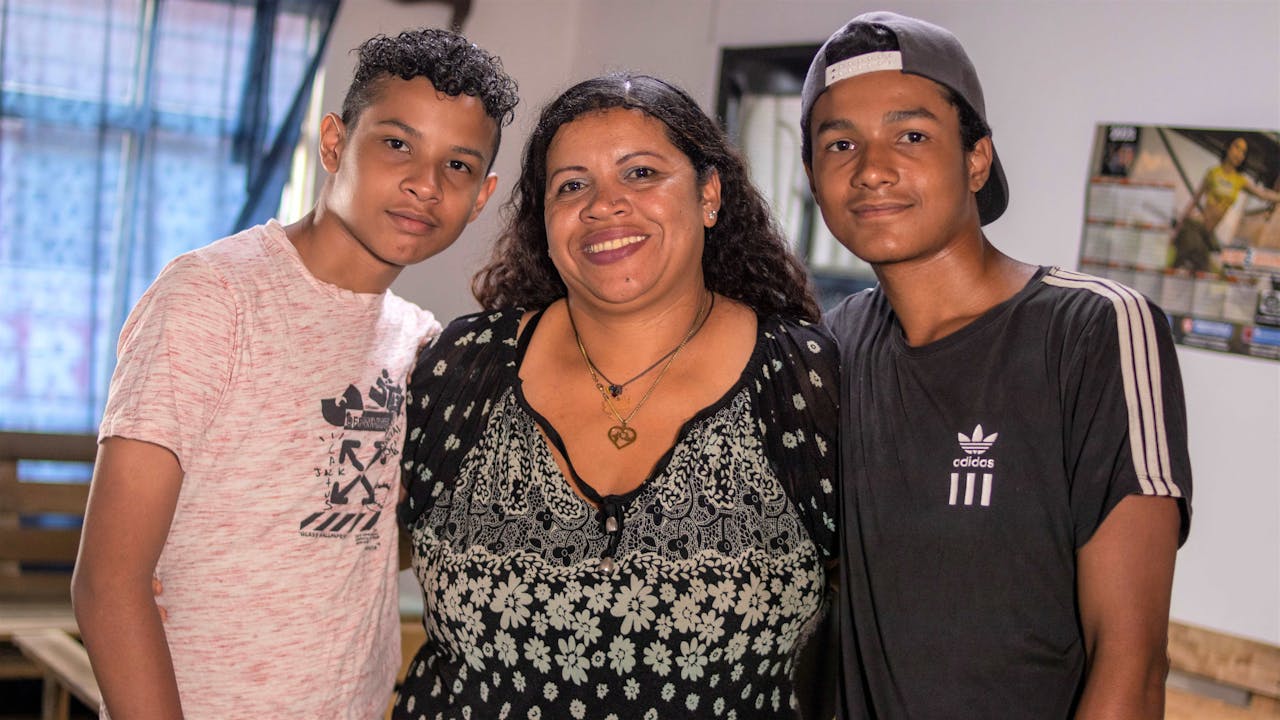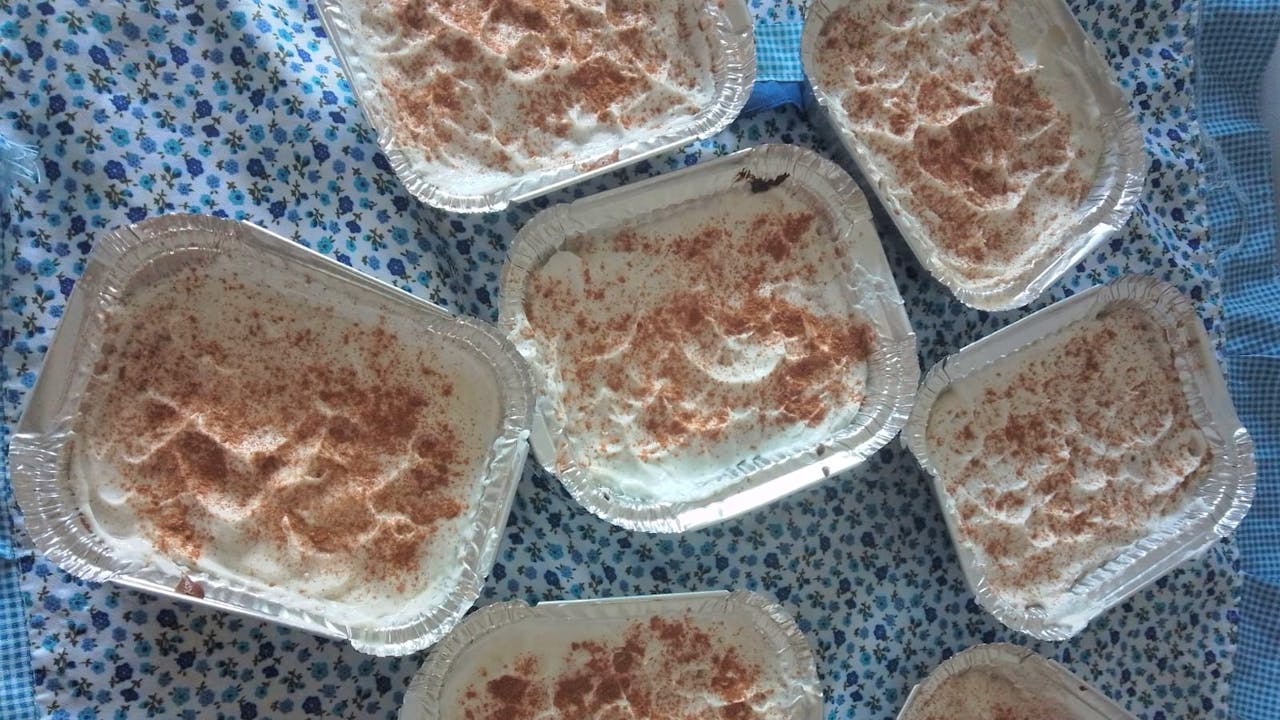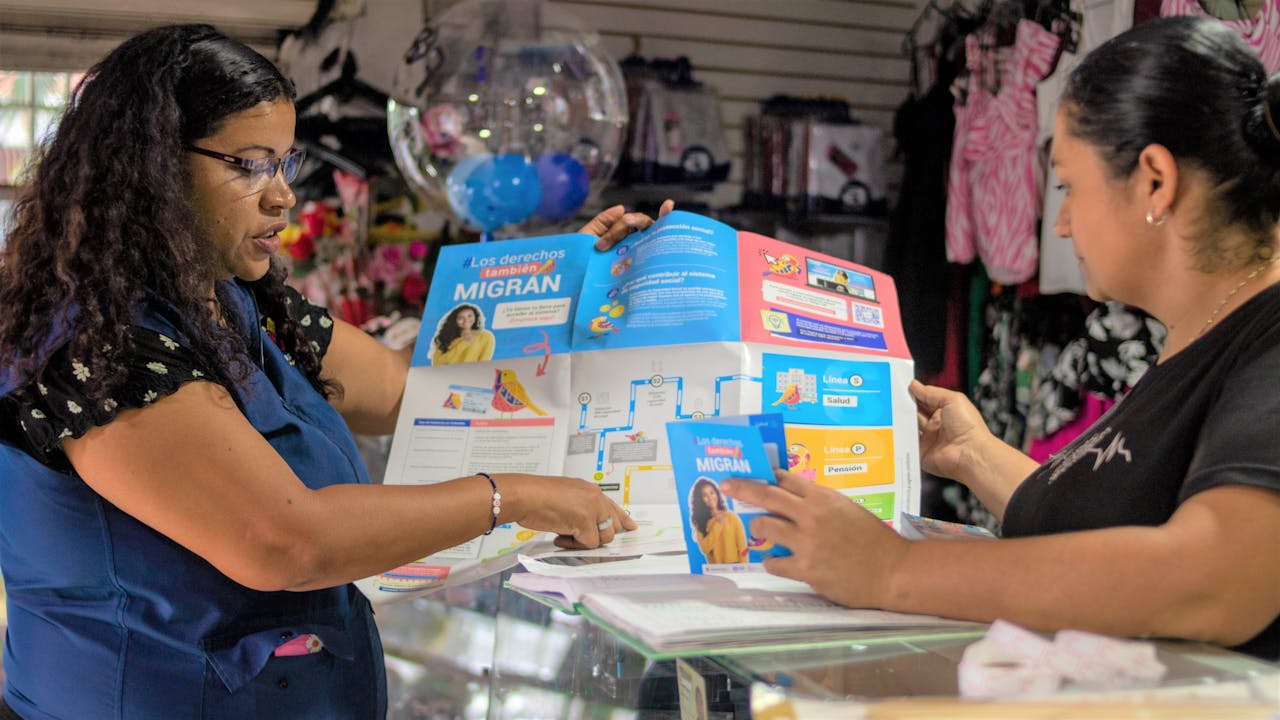We migrated from Venezuela to Colombia in 2021 because our financial situation became too difficult. I trained as a tax administrator but ended up running a school kitchen for 350 children. It was a very tough situation and I fell into a depression.
My husband is an electrical technician and worked for a private company. One day, I told him I was going to leave and go to Colombia. At first he refused and said, “I will die in my country”. So, I told him I would migrate alone because I wanted a better future for my children. Then one day, when he’d finished a contract and been paid, he came home and said, “We have this money. Do we stay or do we go?” I said, “We go!”
When I migrated, I honestly didn’t know that I had the right to social protection benefits, like healthcare and a pension. Since I was an outsider, I simply prayed that I wouldn’t have another hypertension crisis like I had had before. I was convinced that I would die if this happened.
For a year we lived in Cúcuta, just over the border in Colombia. My husband found work in construction and I got a job as a kitchen assistant. Then one evening I had a hypertension crisis and my husband had to stay home from work while I was going through it. The next day he was fired.

These are two of my children. The main reason I wanted to move to Colombia was to give them a better future.
© Mauricio Pulido BonillaWe decided to move to the city of Cali, also in Colombia. I went first with my eldest son. I had a cousin there who said we could stay with him for a couple of weeks while we found our feet.
I got to the bus terminal at midnight. I didn’t sleep or eat. At 7am I hit the streets looking for work. After many days of searching, I found a kitchen assistant position at a vegetarian restaurant. There was no written contract, just a verbal agreement. They paid me US$10 a day. I only lasted two months there as my boss was asking me to do way more than what had been originally agreed. I was very upset. I told my co-worker, “Soon she will be asking us to clean the chef’s undergarments.”
I set up a business called “Yayi’s snacks” selling desserts. I know that I’m going to achieve everything that I have dreamed of.

Soon after, I heard that I could register for a temporary permit on a website. I did it and was called in for my biometrics. Two months later, I was given a national ID card. I did the same process for my entire family and thank God we are all now officially registered as residents in Colombia.
I then decided the best thing for me would be to work independently, like my parents did. When I was 13, my father set up a soft drink business in the main square where we lived in Venezuela and I used to help him. I also helped my mother with her business selling empanadas.
I set up a business called “Yayi’s snacks”, selling desserts. I used to prepare desserts in Venezuela and when I worked at the school, I always made them when there was a birthday celebration.
I love having my own business. I’m not covering all my costs yet but it’s great to be able to contribute to my sons’ education. I sell to people in my neighbourhood and have started getting contracts for events as well. Right now, I’m in a training programme where I’m learning all the administrative parts of running a business. I know that I’m going to achieve everything that I have dreamed of.

These creamy desserts that I make are popular with my clients.
© Ditraiza RamírezI love to serve others. I think that there is a God that watches everything. Even when I don’t get anything back here on Earth, I know that God will repay me, and he will do it with my three children.
I wanted to do something for other Venezuelan migrants like me. I joined a Whatsapp group for the Venezuelan community and found out about a non-governmental organization called “United Colombians and Venezuelans Foundation” or Funcolven. It supports the Venezuelan migrant community. I applied to be a volunteer and I am still there today.
Through Funcolven, I participated in various trainings, including one supported by the International Labour Organization (ILO) called the “Migrant Bird School for Social Protection”. The experience filled my soul. I learned about so many things that I didn’t know before. I learned about the “Rights migrate too” campaign. They taught me about my rights as a migrant worker, including my right to social protection such as a pension and healthcare. They gave us a toolkit, including pamphlets. I have now become a spokesperson for the school.
When I got home, the first thing I did was to talk to my husband about the various risks that he had in his new job as a truck driver. I informed him of his rights and what his employers should cover in his contract. He didn’t know about any of this and he was eager to learn more. I explained that if he was on a trip and had an accident, his employers had to cover his medical expenses. I am now the go-to person for him and his co-workers. If anything happens, they come to me for advice.

I volunteer my time talking to other Venezuelan migrants in my neighbourhood in Cali. I explain step-by-step the process they need to go through to get registered, so they can access social protection benefits in Colombia.
© Mauricio Pulido BonillaI am also involved in a radio project called “Travelling Voices” for Venezuelan migrants in Colombia. After the training I was super excited. I shared what I had learned with my co-workers and suggested interviewing on the show the director of the ILO’s project in Colombia. I said to myself, “if other people can do it, why can’t I do it too and do it well?” They gave me the green light and I did the interview. It was a very significant moment for me.
I love to go out campaigning. I’ll go up to people and say, “Do you know that rights also migrate?” I explain that social protection is a right, regardless of the country we are from.

I love to go out campaigning. I’ll go up to people and say, “Do you know that rights also migrate?” I explain that social protection is a right, regardless of the country we are from. Our rights are ours and nobody can take them away.
I advise them to make sure they are registered for social protection, even if they don’t know if they will stay in this country for very long. It can be a lifeline.
You never know when you may get sick. You can be perfectly fine today and not do so well tomorrow and if you haven’t registered, it will be harder to have access to your rights.
The people I talk to are happy because they have no clue about this.
Learning that we have rights as workers has changed my life. I feel empowered having this knowledge. Now I can give this information as a gift to others who will, in turn, share it with their community. In time the whole community will have this knowledge too.
